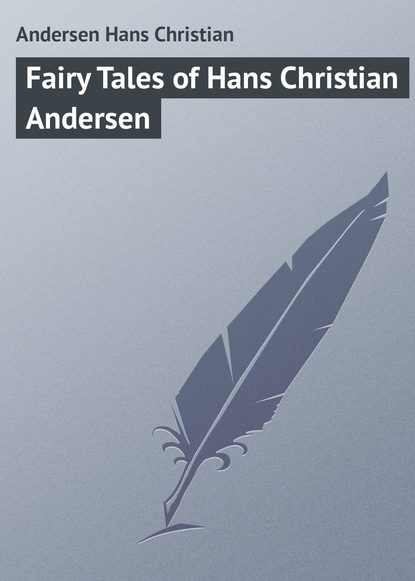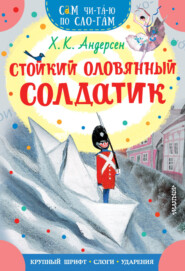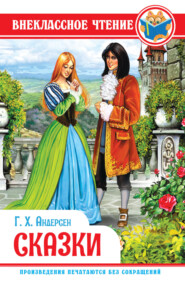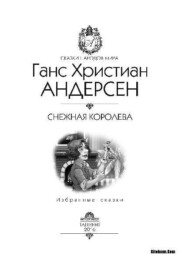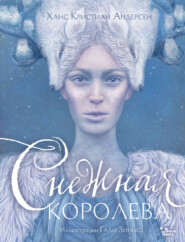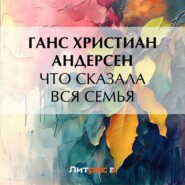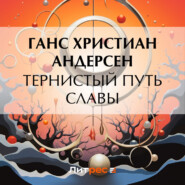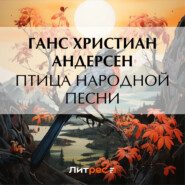По всем вопросам обращайтесь на: info@litportal.ru
(©) 2003-2024.
✖
Fairy Tales of Hans Christian Andersen
Настройки чтения
Размер шрифта
Высота строк
Поля
The town was perfectly still when the clocks struck a quarter to twelve. Presently the window opened, and the princess, who had large black wings to her shoulders, and a long white mantle, flew away over the city towards a high mountain. The fellow-traveller, who had made himself invisible, so that she could not possibly see him, flew after her through the air, and whipped the princess with his rod, so that the blood came whenever he struck her. Ah, it was a strange flight through the air! The wind caught her mantle, so that it spread out on all sides, like the large sail of a ship, and the moon shone through it. "How it hails, to be sure!" said the princess, at each blow she received from the rod; and it served her right to be whipped.
At last she reached the side of the mountain, and knocked. The mountain opened with a noise like the roll of thunder, and the princess went in. The traveller followed her; no one could see him, as he had made himself invisible. They went through a long, wide passage. A thousand gleaming spiders ran here and there on the walls, causing them to glitter as if they were illuminated with fire. They next entered a large hall built of silver and gold. Large red and blue flowers shone on the walls, looking like sunflowers in size, but no one could dare to pluck them, for the stems were hideous poisonous snakes, and the flowers were flames of fire, darting out of their jaws. Shining glow-worms covered the ceiling, and sky-blue bats flapped their transparent wings. Altogether the place had a frightful appearance. In the middle of the floor stood a throne supported by four skeleton horses, whose harness had been made by fiery-red spiders. The throne itself was made of milk-white glass, and the cushions were little black mice, each biting the other's tail. Over it hung a canopy of rose-colored spider's webs, spotted with the prettiest little green flies, which sparkled like precious stones. On the throne sat an old magician with a crown on his ugly head, and a sceptre in his hand. He kissed the princess on the forehead, seated her by his side on the splendid throne, and then the music commenced. Great black grasshoppers played the mouth organ, and the owl struck herself on the body instead of a drum. It was altogether a ridiculous concert. Little black goblins with false lights in their caps danced about the hall; but no one could see the traveller, and he had placed himself just behind the throne where he could see and hear everything. The courtiers who came in afterwards looked noble and grand; but any one with common sense could see what they really were, only broomsticks, with cabbages for heads. The magician had given them life, and dressed them in embroidered robes. It answered very well, as they were only wanted for show. After there had been a little dancing, the princess told the magician that she had a new suitor, and asked him what she could think of for the suitor to guess when he came to the castle the next morning.
"Listen to what I say," said the magician, "you must choose something very easy, he is less likely to guess it then. Think of one of your shoes, he will never imagine it is that. Then cut his head off; and mind you do not forget to bring his eyes with you to-morrow night, that I may eat them."
The princess curtsied low, and said she would not forget the eyes.
The magician then opened the mountain and she flew home again, but the traveller followed and flogged her so much with the rod, that she sighed quite deeply about the heavy hail-storm, and made as much haste as she could to get back to her bedroom through the window. The traveller then returned to the inn where John still slept, took off his wings and laid down on the bed, for he was very tired. Early in the morning John awoke, and when his fellow-traveller got up, he said that he had a very wonderful dream about the princess and her shoe, he therefore advised John to ask her if she had not thought of her shoe. Of course the traveller knew this from what the magician in the mountain had said.
"I may as well say that as anything," said John. "Perhaps your dream may come true; still I will say farewell, for if I guess wrong I shall never see you again."
Then they embraced each other, and John went into the town and walked to the palace. The great hall was full of people, and the judges sat in arm-chairs, with eider-down cushions to rest their heads upon, because they had so much to think of. The old king stood near, wiping his eyes with his white pocket-handkerchief. When the princess entered, she looked even more beautiful than she had appeared the day before, and greeted every one present most gracefully; but to John she gave her hand, and said, "Good morning to you."
Now came the time for John to guess what she was thinking of; and oh, how kindly she looked at him as she spoke. But when he uttered the single word shoe, she turned as pale as a ghost; all her wisdom could not help her, for he had guessed rightly. Oh, how pleased the old king was! It was quite amusing to see how he capered about. All the people clapped their hands, both on his account and John's, who had guessed rightly the first time. His fellow-traveller was glad also, when he heard how successful John had been. But John folded his hands, and thanked God, who, he felt quite sure, would help him again; and he knew he had to guess twice more. The evening passed pleasantly like the one preceding. While John slept, his companion flew behind the princess to the mountain, and flogged her even harder than before; this time he had taken two rods with him. No one saw him go in with her, and he heard all that was said. The princess this time was to think of a glove, and he told John as if he had again heard it in a dream. The next day, therefore, he was able to guess correctly the second time, and it caused great rejoicing at the palace. The whole court jumped about as they had seen the king do the day before, but the princess lay on the sofa, and would not say a single word. All now depended upon John. If he only guessed rightly the third time, he would marry the princess, and reign over the kingdom after the death of the old king: but if he failed, he would lose his life, and the magician would have his beautiful blue eyes. That evening John said his prayers and went to bed very early, and soon fell asleep calmly. But his companion tied on his wings to his shoulders, took three rods, and, with his sword at his side, flew to the palace. It was a very dark night, and so stormy that the tiles flew from the roofs of the houses, and the trees in the garden upon which the skeletons hung bent themselves like reeds before the wind. The lightning flashed, and the thunder rolled in one long-continued peal all night. The window of the castle opened, and the princess flew out. She was pale as death, but she laughed at the storm as if it were not bad enough. Her white mantle fluttered in the wind like a large sail, and the traveller flogged her with the three rods till the blood trickled down, and at last she could scarcely fly; she contrived, however, to reach the mountain. "What a hail-storm!" she said, as she entered; "I have never been out in such weather as this."
"Yes, there may be too much of a good thing sometimes," said the magician.
Then the princess told him that John had guessed rightly the second time, and if he succeeded the next morning, he would win, and she could never come to the mountain again, or practice magic as she had done, and therefore she was quite unhappy. "I will find out something for you to think of which he will never guess, unless he is a greater conjuror than myself. But now let us be merry."
Then he took the princess by both hands, and they danced with all the little goblins and Jack-o'-lanterns in the room. The red spiders sprang here and there on the walls quite as merrily, and the flowers of fire appeared as if they were throwing out sparks. The owl beat the drum, the crickets whistled and the grasshoppers played the mouth-organ. It was a very ridiculous ball. After they had danced enough, the princess was obliged to go home, for fear she should be missed at the palace. The magician offered to go with her, that they might be company to each other on the way. Then they flew away through the bad weather, and the traveller followed them, and broke his three rods across their shoulders. The magician had never been out in such a hail-storm as this. Just by the palace the magician stopped to wish the princess farewell, and to whisper in her ear, "To-morrow think of my head."
But the traveller heard it, and just as the princess slipped through the window into her bedroom, and the magician turned round to fly back to the mountain, he seized him by the long black beard, and with his sabre cut off the wicked conjuror's head just behind the shoulders, so that he could not even see who it was. He threw the body into the sea to the fishes, and after dipping the head into the water, he tied it up in a silk handkerchief, took it with him to the inn, and then went to bed. The next morning he gave John the handkerchief, and told him not to untie it till the princess asked him what she was thinking of. There were so many people in the great hall of the palace that they stood as thick as radishes tied together in a bundle. The council sat in their arm-chairs with the white cushions. The old king wore new robes, and the golden crown and sceptre had been polished up so that he looked quite smart. But the princess was very pale, and wore a black dress as if she were going to a funeral.
"What have I thought of?" asked the princess, of John. He immediately untied the handkerchief, and was himself quite frightened when he saw the head of the ugly magician. Every one shuddered, for it was terrible to look at; but the princess sat like a statue, and could not utter a single word. At length she rose and gave John her hand, for he had guessed rightly.
She looked at no one, but sighed deeply, and said, "You are my master now; this evening our marriage must take place."
"I am very pleased to hear it," said the old king. "It is just what I wish."
Then all the people shouted "Hurrah." The band played music in the streets, the bells rang, and the cake-women took the black crape off the sugar-sticks. There was universal joy. Three oxen, stuffed with ducks and chickens, were roasted whole in the market-place, where every one might help himself to a slice. The fountains spouted forth the most delicious wine, and whoever bought a penny loaf at the baker's received six large buns, full of raisins, as a present. In the evening the whole town was illuminated. The soldiers fired off cannons, and the boys let off crackers. There was eating and drinking, dancing and jumping everywhere. In the palace, the high-born gentlemen and beautiful ladies danced with each other, and they could be heard at a great distance singing the following song: —
"Here are maidens, young and fair,
Dancing in the summer air;
Like two spinning-wheels at play,
Pretty maidens dance away —
Dance the spring and summer through
Till the sole falls from your shoe."
But the princess was still a witch, and she could not love John. His fellow-traveller had thought of that, so he gave John three feathers out of the swan's wings, and a little bottle with a few drops in it. He told him to place a large bath full of water by the princess's bed, and put the feathers and the drops into it. Then, at the moment she was about to get into bed, he must give her a little push, so that she might fall into the water, and then dip her three times. This would destroy the power of the magician, and she would love him very much. John did all that his companion told him to do. The princess shrieked aloud when he dipped her under the water the first time, and struggled under his hands in the form of a great black swan with fiery eyes. As she rose the second time from the water, the swan had become white, with a black ring round its neck. John allowed the water to close once more over the bird, and at the same time it changed into a most beautiful princess. She was more lovely even than before, and thanked him, while her eyes sparkled with tears, for having broken the spell of the magician. The next day, the king came with the whole court to offer their congratulations, and stayed till quite late. Last of all came the travelling companion; he had his staff in his hand and his knapsack on his back. John kissed him many times and told him he must not go, he must remain with him, for he was the cause of all his good fortune. But the traveller shook his head, and said gently and kindly, "No: my time is up now; I have only paid my debt to you. Do you remember the dead man whom the bad people wished to throw out of his coffin? You gave all you possessed that he might rest in his grave; I am that man." As he said this, he vanished.
The wedding festivities lasted a whole month. John and his princess loved each other dearly, and the old king lived to see many a happy day, when he took their little children on his knees and let them play with his sceptre. And John became king over the whole country.
TWO BROTHERS
On one of the Danish islands, where old Thingstones, the seats of justice of our forefathers, still stand in the cornfields, and huge trees rise in the forests of beech, there lies a little town whose low houses are covered with red tiles. In one of these houses strange things were brewing over the glowing coals on the open hearth; there was a boiling going on in glasses, and a mixing and distilling, while herbs were being cut up and pounded in mortars. An elderly man looked after it all.
"One must only do the right thing," he said; "yes, the right – the correct thing. One must find out the truth concerning every created particle, and keep to that."
In the room with the good housewife sat her two sons; they were still small, but had great thoughts. Their mother, too, had always spoken to them of right and justice, and exhorted them to keep to the truth, which she said was the countenance of the Lord in this world.
The elder of the boys looked roguish and enterprising. He took a delight in reading of the forces of nature, of the sun and the moon; no fairy tale pleased him so much. Oh, how beautiful it must be, he thought, to go on voyages of discovery, or to find out how to imitate the wings of birds and then to be able to fly! Yes, to find that out was the right thing. Father was right, and mother was right – truth holds the world together.
The younger brother was quieter, and buried himself entirely in his books. When he read about Jacob dressing himself in sheep-skins to personify Esau, and so to usurp his brother's birthright, he would clench his little fist in anger against the deceiver; when he read of tyrants and of the injustice and wickedness of the world, tears would come into his eyes, and he was quite filled with the thought of the justice and truth which must and would triumph.
One evening he was lying in bed, but the curtains were not yet drawn close, and the light streamed in upon him; he had taken his book into bed with him, for he wanted to finish reading the story of Solon. His thoughts lifted and carried him away a wonderful distance; it seemed to him as if the bed had become a ship flying along under full sail. Was he dreaming, or what was happening? It glided over the rolling waves and across the ocean of time, and to him came the voice of Solon; spoken in a strange tongue, yet intelligible to him, he heard the Danish motto: "By law the land is ruled."
The genius of the human race stood in the humble room, bent down over the bed and imprinted a kiss on the boy's forehead: "Be thou strong in fame and strong in the battle of life! With truth in thy heart fly toward the land of truth!"
The elder brother was not yet in bed; he was standing at the window looking out at the mist which rose from the meadows. They were not elves dancing out there, as their old nurse had told him; he knew better – they were vapours which were warmer than the air, and that is why they rose. A shooting star lit up the sky, and the boy's thoughts passed in a second from the vapours of the earth up to the shining meteor. The stars gleamed in the heavens, and it seemed as if long golden threads hung down from them to the earth.
"Fly with me," sang a voice, which the boy heard in his heart. And the mighty genius of mankind, swifter than a bird and than an arrow – swifter than anything of earthly origin – carried him out into space, where the heavenly bodies are bound together by the rays that pass from star to star. Our earth revolved in the thin air, and the cities upon it seemed to lie close to each other. Through the spheres echoed the words:
"What is near, what is far, when thou art lifted by the mighty genius of mind?"
And again the boy stood by the window, gazing out, whilst his younger brother lay in bed. Their mother called them by their names: "Anders Sandoe" and "Hans Christian."
Denmark and the whole world knows them – the two brothers Oersted.
TWO MAIDENS
Have you ever seen a maiden? I mean what our pavers call a maiden, a thing with which they ram down the paving-stones in the roads. A maiden of this kind is made altogether of wood, broad below, and girt round with iron rings. At the top she is narrow, and has a stick passed across through her waist, and this stick forms the arms of the maiden.
In the shed stood two Maidens of this kind. They had their place among shovels, hand-carts, wheelbarrows, and measuring-tapes; and to all this company the news had come that the Maidens were no longer to be called "maidens," but "hand-rammers," which word was the newest and the only correct designation among the pavers for the thing we all know from the old times by the name of "the maiden."
Now, there are among us human creatures certain individuals who are known as "emancipated women," as, for instance, principals of institutions, dancers who stand professionally on one leg, milliners, and sick-nurses; and with this class of emancipated women the two Maidens in the shed associated themselves. They were "maidens" among the paver folk, and determined not to give up this honorable appellation, and let themselves be miscalled "rammers.
"Maiden is a human name, but hand-rammer is a thing, and we won't be called things – that's insulting us."
"My lover would be ready to give up his engagement," said the youngest, who was betrothed to a paver's hammer; and the hammer is the thing which drives great piles into the earth, like a machine, and therefore does on a large scale what ten maidens effect in a similar way. "He wants to marry me as a maiden, but whether he would have me were I a hand-rammer is a question, so I won't have my name changed."
"And I," said the elder one, "would rather have both my arms broken off."
But the Wheelbarrow was of a different opinion; and the Wheelbarrow was looked upon as of some consequence, for he considered himself a quarter of a coach, because he went about upon one wheel.
"I must submit to your notice," he said, "that the name 'maiden' is common enough, and not nearly so refined as 'hand-rammer,' or 'stamper,' which latter has also been proposed, and through which you would be introduced into the category of seals; and only think of the great stamp of state, which impresses the royal seal that gives effect to the laws! No, in your case I would surrender my maiden name."
"No, certainly not!" exclaimed the elder. "I am too old for that."
"I presume you have never heard of what is called 'European necessity?'" observed the honest Measuring Tape. "One must be able to adapt one's self to time and circumstances, and if there is a law that the 'maiden' is to be called 'hand-rammer,' why, she must be called 'hand-rammer,' and no pouting will avail, for everything has its measure."
"No; if there must be a change," said the younger, "I should prefer to be called 'Missy,' for that reminds one a little of maidens."
"But I would rather be chopped to chips," said the elder.
At last they all went to work. The Maidens rode – that is, they were put in a wheelbarrow, and that was a distinction; but still they were called "hand-rammers."
"Mai – !" they said, as they were bumped upon the pavement. "Mai – !" and they were very nearly pronouncing the whole word "maiden;" but they broke off short, and swallowed the last syllable; for after mature deliberation they considered it beneath their dignity to protest. But they always called each other "maiden," and praised the good old days in which everything had been called by its right name, and those who were maidens were called maidens. And they remained as they were; for the hammer really broke off his engagement with the younger one, for nothing would suit him but he must have a maiden for his bride.
THE UGLY DUCKLING
At last she reached the side of the mountain, and knocked. The mountain opened with a noise like the roll of thunder, and the princess went in. The traveller followed her; no one could see him, as he had made himself invisible. They went through a long, wide passage. A thousand gleaming spiders ran here and there on the walls, causing them to glitter as if they were illuminated with fire. They next entered a large hall built of silver and gold. Large red and blue flowers shone on the walls, looking like sunflowers in size, but no one could dare to pluck them, for the stems were hideous poisonous snakes, and the flowers were flames of fire, darting out of their jaws. Shining glow-worms covered the ceiling, and sky-blue bats flapped their transparent wings. Altogether the place had a frightful appearance. In the middle of the floor stood a throne supported by four skeleton horses, whose harness had been made by fiery-red spiders. The throne itself was made of milk-white glass, and the cushions were little black mice, each biting the other's tail. Over it hung a canopy of rose-colored spider's webs, spotted with the prettiest little green flies, which sparkled like precious stones. On the throne sat an old magician with a crown on his ugly head, and a sceptre in his hand. He kissed the princess on the forehead, seated her by his side on the splendid throne, and then the music commenced. Great black grasshoppers played the mouth organ, and the owl struck herself on the body instead of a drum. It was altogether a ridiculous concert. Little black goblins with false lights in their caps danced about the hall; but no one could see the traveller, and he had placed himself just behind the throne where he could see and hear everything. The courtiers who came in afterwards looked noble and grand; but any one with common sense could see what they really were, only broomsticks, with cabbages for heads. The magician had given them life, and dressed them in embroidered robes. It answered very well, as they were only wanted for show. After there had been a little dancing, the princess told the magician that she had a new suitor, and asked him what she could think of for the suitor to guess when he came to the castle the next morning.
"Listen to what I say," said the magician, "you must choose something very easy, he is less likely to guess it then. Think of one of your shoes, he will never imagine it is that. Then cut his head off; and mind you do not forget to bring his eyes with you to-morrow night, that I may eat them."
The princess curtsied low, and said she would not forget the eyes.
The magician then opened the mountain and she flew home again, but the traveller followed and flogged her so much with the rod, that she sighed quite deeply about the heavy hail-storm, and made as much haste as she could to get back to her bedroom through the window. The traveller then returned to the inn where John still slept, took off his wings and laid down on the bed, for he was very tired. Early in the morning John awoke, and when his fellow-traveller got up, he said that he had a very wonderful dream about the princess and her shoe, he therefore advised John to ask her if she had not thought of her shoe. Of course the traveller knew this from what the magician in the mountain had said.
"I may as well say that as anything," said John. "Perhaps your dream may come true; still I will say farewell, for if I guess wrong I shall never see you again."
Then they embraced each other, and John went into the town and walked to the palace. The great hall was full of people, and the judges sat in arm-chairs, with eider-down cushions to rest their heads upon, because they had so much to think of. The old king stood near, wiping his eyes with his white pocket-handkerchief. When the princess entered, she looked even more beautiful than she had appeared the day before, and greeted every one present most gracefully; but to John she gave her hand, and said, "Good morning to you."
Now came the time for John to guess what she was thinking of; and oh, how kindly she looked at him as she spoke. But when he uttered the single word shoe, she turned as pale as a ghost; all her wisdom could not help her, for he had guessed rightly. Oh, how pleased the old king was! It was quite amusing to see how he capered about. All the people clapped their hands, both on his account and John's, who had guessed rightly the first time. His fellow-traveller was glad also, when he heard how successful John had been. But John folded his hands, and thanked God, who, he felt quite sure, would help him again; and he knew he had to guess twice more. The evening passed pleasantly like the one preceding. While John slept, his companion flew behind the princess to the mountain, and flogged her even harder than before; this time he had taken two rods with him. No one saw him go in with her, and he heard all that was said. The princess this time was to think of a glove, and he told John as if he had again heard it in a dream. The next day, therefore, he was able to guess correctly the second time, and it caused great rejoicing at the palace. The whole court jumped about as they had seen the king do the day before, but the princess lay on the sofa, and would not say a single word. All now depended upon John. If he only guessed rightly the third time, he would marry the princess, and reign over the kingdom after the death of the old king: but if he failed, he would lose his life, and the magician would have his beautiful blue eyes. That evening John said his prayers and went to bed very early, and soon fell asleep calmly. But his companion tied on his wings to his shoulders, took three rods, and, with his sword at his side, flew to the palace. It was a very dark night, and so stormy that the tiles flew from the roofs of the houses, and the trees in the garden upon which the skeletons hung bent themselves like reeds before the wind. The lightning flashed, and the thunder rolled in one long-continued peal all night. The window of the castle opened, and the princess flew out. She was pale as death, but she laughed at the storm as if it were not bad enough. Her white mantle fluttered in the wind like a large sail, and the traveller flogged her with the three rods till the blood trickled down, and at last she could scarcely fly; she contrived, however, to reach the mountain. "What a hail-storm!" she said, as she entered; "I have never been out in such weather as this."
"Yes, there may be too much of a good thing sometimes," said the magician.
Then the princess told him that John had guessed rightly the second time, and if he succeeded the next morning, he would win, and she could never come to the mountain again, or practice magic as she had done, and therefore she was quite unhappy. "I will find out something for you to think of which he will never guess, unless he is a greater conjuror than myself. But now let us be merry."
Then he took the princess by both hands, and they danced with all the little goblins and Jack-o'-lanterns in the room. The red spiders sprang here and there on the walls quite as merrily, and the flowers of fire appeared as if they were throwing out sparks. The owl beat the drum, the crickets whistled and the grasshoppers played the mouth-organ. It was a very ridiculous ball. After they had danced enough, the princess was obliged to go home, for fear she should be missed at the palace. The magician offered to go with her, that they might be company to each other on the way. Then they flew away through the bad weather, and the traveller followed them, and broke his three rods across their shoulders. The magician had never been out in such a hail-storm as this. Just by the palace the magician stopped to wish the princess farewell, and to whisper in her ear, "To-morrow think of my head."
But the traveller heard it, and just as the princess slipped through the window into her bedroom, and the magician turned round to fly back to the mountain, he seized him by the long black beard, and with his sabre cut off the wicked conjuror's head just behind the shoulders, so that he could not even see who it was. He threw the body into the sea to the fishes, and after dipping the head into the water, he tied it up in a silk handkerchief, took it with him to the inn, and then went to bed. The next morning he gave John the handkerchief, and told him not to untie it till the princess asked him what she was thinking of. There were so many people in the great hall of the palace that they stood as thick as radishes tied together in a bundle. The council sat in their arm-chairs with the white cushions. The old king wore new robes, and the golden crown and sceptre had been polished up so that he looked quite smart. But the princess was very pale, and wore a black dress as if she were going to a funeral.
"What have I thought of?" asked the princess, of John. He immediately untied the handkerchief, and was himself quite frightened when he saw the head of the ugly magician. Every one shuddered, for it was terrible to look at; but the princess sat like a statue, and could not utter a single word. At length she rose and gave John her hand, for he had guessed rightly.
She looked at no one, but sighed deeply, and said, "You are my master now; this evening our marriage must take place."
"I am very pleased to hear it," said the old king. "It is just what I wish."
Then all the people shouted "Hurrah." The band played music in the streets, the bells rang, and the cake-women took the black crape off the sugar-sticks. There was universal joy. Three oxen, stuffed with ducks and chickens, were roasted whole in the market-place, where every one might help himself to a slice. The fountains spouted forth the most delicious wine, and whoever bought a penny loaf at the baker's received six large buns, full of raisins, as a present. In the evening the whole town was illuminated. The soldiers fired off cannons, and the boys let off crackers. There was eating and drinking, dancing and jumping everywhere. In the palace, the high-born gentlemen and beautiful ladies danced with each other, and they could be heard at a great distance singing the following song: —
"Here are maidens, young and fair,
Dancing in the summer air;
Like two spinning-wheels at play,
Pretty maidens dance away —
Dance the spring and summer through
Till the sole falls from your shoe."
But the princess was still a witch, and she could not love John. His fellow-traveller had thought of that, so he gave John three feathers out of the swan's wings, and a little bottle with a few drops in it. He told him to place a large bath full of water by the princess's bed, and put the feathers and the drops into it. Then, at the moment she was about to get into bed, he must give her a little push, so that she might fall into the water, and then dip her three times. This would destroy the power of the magician, and she would love him very much. John did all that his companion told him to do. The princess shrieked aloud when he dipped her under the water the first time, and struggled under his hands in the form of a great black swan with fiery eyes. As she rose the second time from the water, the swan had become white, with a black ring round its neck. John allowed the water to close once more over the bird, and at the same time it changed into a most beautiful princess. She was more lovely even than before, and thanked him, while her eyes sparkled with tears, for having broken the spell of the magician. The next day, the king came with the whole court to offer their congratulations, and stayed till quite late. Last of all came the travelling companion; he had his staff in his hand and his knapsack on his back. John kissed him many times and told him he must not go, he must remain with him, for he was the cause of all his good fortune. But the traveller shook his head, and said gently and kindly, "No: my time is up now; I have only paid my debt to you. Do you remember the dead man whom the bad people wished to throw out of his coffin? You gave all you possessed that he might rest in his grave; I am that man." As he said this, he vanished.
The wedding festivities lasted a whole month. John and his princess loved each other dearly, and the old king lived to see many a happy day, when he took their little children on his knees and let them play with his sceptre. And John became king over the whole country.
TWO BROTHERS
On one of the Danish islands, where old Thingstones, the seats of justice of our forefathers, still stand in the cornfields, and huge trees rise in the forests of beech, there lies a little town whose low houses are covered with red tiles. In one of these houses strange things were brewing over the glowing coals on the open hearth; there was a boiling going on in glasses, and a mixing and distilling, while herbs were being cut up and pounded in mortars. An elderly man looked after it all.
"One must only do the right thing," he said; "yes, the right – the correct thing. One must find out the truth concerning every created particle, and keep to that."
In the room with the good housewife sat her two sons; they were still small, but had great thoughts. Their mother, too, had always spoken to them of right and justice, and exhorted them to keep to the truth, which she said was the countenance of the Lord in this world.
The elder of the boys looked roguish and enterprising. He took a delight in reading of the forces of nature, of the sun and the moon; no fairy tale pleased him so much. Oh, how beautiful it must be, he thought, to go on voyages of discovery, or to find out how to imitate the wings of birds and then to be able to fly! Yes, to find that out was the right thing. Father was right, and mother was right – truth holds the world together.
The younger brother was quieter, and buried himself entirely in his books. When he read about Jacob dressing himself in sheep-skins to personify Esau, and so to usurp his brother's birthright, he would clench his little fist in anger against the deceiver; when he read of tyrants and of the injustice and wickedness of the world, tears would come into his eyes, and he was quite filled with the thought of the justice and truth which must and would triumph.
One evening he was lying in bed, but the curtains were not yet drawn close, and the light streamed in upon him; he had taken his book into bed with him, for he wanted to finish reading the story of Solon. His thoughts lifted and carried him away a wonderful distance; it seemed to him as if the bed had become a ship flying along under full sail. Was he dreaming, or what was happening? It glided over the rolling waves and across the ocean of time, and to him came the voice of Solon; spoken in a strange tongue, yet intelligible to him, he heard the Danish motto: "By law the land is ruled."
The genius of the human race stood in the humble room, bent down over the bed and imprinted a kiss on the boy's forehead: "Be thou strong in fame and strong in the battle of life! With truth in thy heart fly toward the land of truth!"
The elder brother was not yet in bed; he was standing at the window looking out at the mist which rose from the meadows. They were not elves dancing out there, as their old nurse had told him; he knew better – they were vapours which were warmer than the air, and that is why they rose. A shooting star lit up the sky, and the boy's thoughts passed in a second from the vapours of the earth up to the shining meteor. The stars gleamed in the heavens, and it seemed as if long golden threads hung down from them to the earth.
"Fly with me," sang a voice, which the boy heard in his heart. And the mighty genius of mankind, swifter than a bird and than an arrow – swifter than anything of earthly origin – carried him out into space, where the heavenly bodies are bound together by the rays that pass from star to star. Our earth revolved in the thin air, and the cities upon it seemed to lie close to each other. Through the spheres echoed the words:
"What is near, what is far, when thou art lifted by the mighty genius of mind?"
And again the boy stood by the window, gazing out, whilst his younger brother lay in bed. Their mother called them by their names: "Anders Sandoe" and "Hans Christian."
Denmark and the whole world knows them – the two brothers Oersted.
TWO MAIDENS
Have you ever seen a maiden? I mean what our pavers call a maiden, a thing with which they ram down the paving-stones in the roads. A maiden of this kind is made altogether of wood, broad below, and girt round with iron rings. At the top she is narrow, and has a stick passed across through her waist, and this stick forms the arms of the maiden.
In the shed stood two Maidens of this kind. They had their place among shovels, hand-carts, wheelbarrows, and measuring-tapes; and to all this company the news had come that the Maidens were no longer to be called "maidens," but "hand-rammers," which word was the newest and the only correct designation among the pavers for the thing we all know from the old times by the name of "the maiden."
Now, there are among us human creatures certain individuals who are known as "emancipated women," as, for instance, principals of institutions, dancers who stand professionally on one leg, milliners, and sick-nurses; and with this class of emancipated women the two Maidens in the shed associated themselves. They were "maidens" among the paver folk, and determined not to give up this honorable appellation, and let themselves be miscalled "rammers.
"Maiden is a human name, but hand-rammer is a thing, and we won't be called things – that's insulting us."
"My lover would be ready to give up his engagement," said the youngest, who was betrothed to a paver's hammer; and the hammer is the thing which drives great piles into the earth, like a machine, and therefore does on a large scale what ten maidens effect in a similar way. "He wants to marry me as a maiden, but whether he would have me were I a hand-rammer is a question, so I won't have my name changed."
"And I," said the elder one, "would rather have both my arms broken off."
But the Wheelbarrow was of a different opinion; and the Wheelbarrow was looked upon as of some consequence, for he considered himself a quarter of a coach, because he went about upon one wheel.
"I must submit to your notice," he said, "that the name 'maiden' is common enough, and not nearly so refined as 'hand-rammer,' or 'stamper,' which latter has also been proposed, and through which you would be introduced into the category of seals; and only think of the great stamp of state, which impresses the royal seal that gives effect to the laws! No, in your case I would surrender my maiden name."
"No, certainly not!" exclaimed the elder. "I am too old for that."
"I presume you have never heard of what is called 'European necessity?'" observed the honest Measuring Tape. "One must be able to adapt one's self to time and circumstances, and if there is a law that the 'maiden' is to be called 'hand-rammer,' why, she must be called 'hand-rammer,' and no pouting will avail, for everything has its measure."
"No; if there must be a change," said the younger, "I should prefer to be called 'Missy,' for that reminds one a little of maidens."
"But I would rather be chopped to chips," said the elder.
At last they all went to work. The Maidens rode – that is, they were put in a wheelbarrow, and that was a distinction; but still they were called "hand-rammers."
"Mai – !" they said, as they were bumped upon the pavement. "Mai – !" and they were very nearly pronouncing the whole word "maiden;" but they broke off short, and swallowed the last syllable; for after mature deliberation they considered it beneath their dignity to protest. But they always called each other "maiden," and praised the good old days in which everything had been called by its right name, and those who were maidens were called maidens. And they remained as they were; for the hammer really broke off his engagement with the younger one, for nothing would suit him but he must have a maiden for his bride.
THE UGLY DUCKLING





